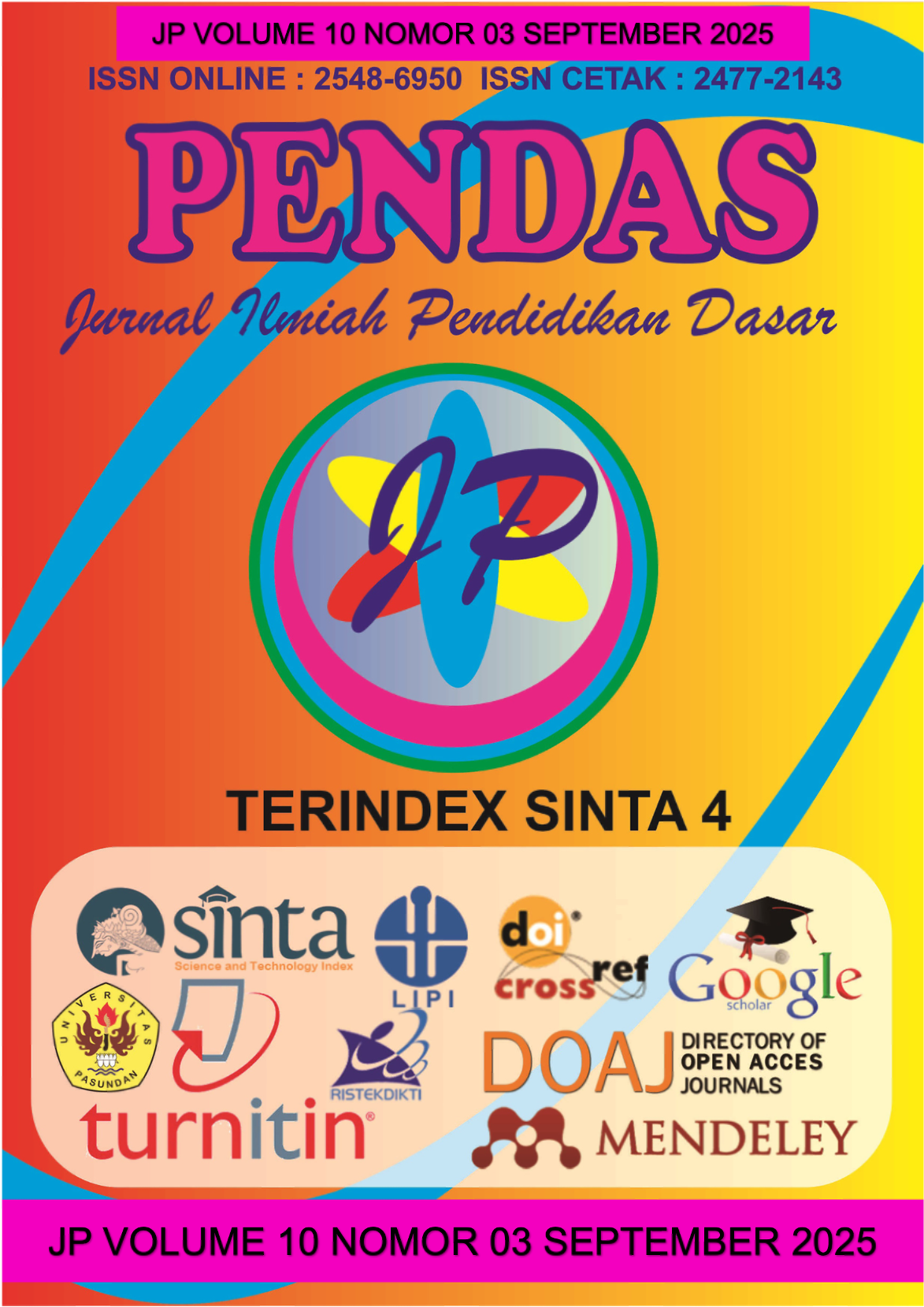HUBUNGAN ANTARA POLA ASUH ORANG TUA DAN KEPERCAYAAN DIRI SISWA KELAS V SEKOLAH DASAR NEGERI DI KELURAHAN KAPUK
DOI:
https://doi.org/10.23969/jp.v10i03.31538Keywords:
Parenting Style, Self-Confidence, Elementary SchoolAbstract
This purpose of this study was to empirically determine the relationship between
parental parenting and self-confidence of fifth grade students of public elementary
schools at Kelurahan Kapuk. This study uses quantitative research methods,
which is a research approach that uses data in the form of numbers and statistical
analysis to understand phenomena. The sample in this study were fifth grade
students of SDN Kapuk 03 Pagi and fifth grade students of SDN Kapuk 12 Petang
as many as 92 respondents. The instrument used was a questionnaire with 20
statements for variable X and 20 statements for variable Y. The data was then
processed and analyzed using the t-test. Based on the t-test calculation, the t-
count value is 6.469, while the t-table value is 0.205. So it can be concluded that
there is a positive relationship between parenting patterns and self-confidence of
grade V public elementary school students at Kelurahan Kapuk. The strength of
this relationship is classified in the moderate category. The contribution given by
the parenting variable to self-confidence is 31.7%, while the other 68.3% is
influenced by other independent variables.
Downloads
References
Ahmad, A., Hasan, H., & Wahyuni, N.
(2018). Pengaruh Pola Asuh
Otoriter terhadap PerilakuAnak di Sekolah. Jurnal
Pendidikan Anak Usia Dini,
6(1), 45–52.
Arikunto, S. (2010). Prosedur
Penelitian: Suatu Pendekatan
Praktik (Edisi Revisi). Jakarta:
Rineka Cipta.
Baumrind, D. (1966). Child Care
Practices Anteceding Three
Patterns of Preschool
Behavior. Berkeley: University
of California Press.
BPS Jakarta Barat. (2023). Profil
Kecamatan Kapuk.
Coleman, J. C. (2003). Personality
Dynamics and Effective
Behavior. New York: Scott,
Foresman and Company.
Creswell, J. W. (2012). Educational
Research: Planning,
Conducting, and Evaluating
Quantitative and Qualitative
Research (4th ed.). Boston:
Pearson Education.
Erikson, E. H. (1968). Identity: Youth
and Crisis. New York: W.W.
Norton & Company.
Hakim, T. (2010). Character Building:
Membentuk Karakter Membina
Sukses Masa Depan.
Bandung: Remaja
Rosdakarya.
Hurlock, E. B. (1990). Psikologi
Perkembangan: Suatu
Pendekatan Sepanjang
Rentang Kehidupan. Jakarta:
Erlangga.
Husna, L. & Suryana, D. (2019).
Pengaruh Pola Asuh terhadap
Kepribadian Anak. Bandung:
Alfabeta.
Lauster, P. (2002). Kepribadian:
Siapa Anda?. Jakarta: Pustaka
Pelajar.
Lindenfield, G. (2000). Confident
Children. London: Thorsons.
Maccoby, E. E., & Martin, J. A.
(1983). Socialization in the
Context of the Family: Parent-
Child Interaction. Handbook of
Child Psychology.Madyawati, L. (2011). Psikologi
Perkembangan Anak Usia
Dini. Bandung: Kencana.
Mawarni, R., Iskandar, I., & Arifah, S.
(2021). Hubungan Pola Asuh
Orang Tua dengan
Kepercayaan Diri Anak Usia
4–6 Tahun di TK Raudhatul
Jannah Kabupaten
Bengkayang. Jurnal
Pendidikan Anak, 5(2), 33–42.
Sugiyono. (2017). Metode Penelitian
Pendidikan (Pendekatan
Kuantitatif, Kualitatif, dan
R&D). Bandung: Alfabeta.
Vianda Yustia Ekadaya. (2021).
Hubungan Pola Asuh dengan
Kepercayaan Diri Siswa Kelas
V SD Muhammadiyah
Program Plus Besuki
Tulungagung. Jurnal
Pendidikan Karakter, 11(3),
230–245.
Downloads
Published
Issue
Section
License
Copyright (c) 2025 Pendas : Jurnal Ilmiah Pendidikan Dasar

This work is licensed under a Creative Commons Attribution 4.0 International License.



















